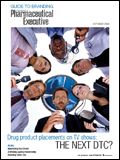Branding Under Fire
Between Congress, the courts, and consumers, DTC is having a rough year. Pharma marketers are now being pressured to delay direct-to-consumer advertising for six months. Is it time to pay more attention to educating doctors and patients?
Last year's Pharmaceutical Executive's GUIDE TO BRANDING took a look at the state of direct-to-consumer (DTC) marketing 10 years after the FDA relaxed its guidelines on advertising pharmaceuticals in broadcast media. The industry's 2006 DTC expenditure was $4.5 billion, representing a 220 percent increase over the 1997 expenditure of $1.4 billion, according to IMS. And while ROI is not always easy to determine, the median return on investment for brands that employed DTC advertising in the IMS normative database was $2.20 for each dollar invested.

Dale Taylor, AbelsonTaylor
There was, however, a cloud on the horizon that threatened to change the future of DTC promotion—the pending legislation in both the House and Senate that would authorize FDA to screen all advertisements before public release and impose a multiyear moratorium on TV advertising after a product had been approved for marketing.
CLOUDS THICKEN
Well, the future is here. And between the courts and Congress, DTC's storm clouds have only gotten thicker. While FDA's plan for premarketing review of television advertisements legislation was shelved in 2008, it is expected to rear its head again. The agency's 2009 budget includes a telling increase of $14 million for DTC television ad review.
As for a multiyear moratorium on DTC advertising, that too remains a suspended threat. In June, Merck, Schering-Plough, Johnson&Johnson, and Pfizer agreed to a voluntary six-month moratorium on advertising new drugs to consumers.
The move came in response to requests from House Energy and Commerce Committee Chairman John Dingell (D-MI) and Rep. Bart Stupak (D-MI), who heads the committee's oversight and investigations panel.
Dingell and Stupak sought a two-year voluntary moratorium on DTC advertising, and possibly even longer in the case of drugs for which not all studies have been completed. The lawmakers also asked for limits on the use of doctors in ads and agreement to Black Box warnings on ads, if requested by FDA.
The drug companies agreed to follow AMA guidelines regarding use of doctors and actors portraying doctors, and not to advertise off-label uses in DTC ads. In addition, the Pharmaceutical Research and Manufacturers of America (PhRMA) agreed to hold further meetings with the committee.

Nancy Beesley, HC&B Healthcare Communications
The drug companies informed the committee that the six-month moratorium only formalized an industry practice already in place—to educate doctors before moving to consumer communications. "We have adopted internal guiding practices on direct-to-consumer advertising for prescription drugs that requires that our operating companies spend at least six months after approval of a new medicine educating health professionals before commencing a direct-to-consumer advertising campaign," wrote William C. Weldon, chairman and CEO of Johnson & Johnson.

Bill Drummy, Heartbeat Digital
Dingell and Stupak said they were pleased by the drug companies' response, but that they still wanted a two-year limit. Stupak stated: "Although we appreciate the drug companies' willingness to change some of their business practices, they have not agreed to all of our requests, which would protect consumers from misleading and deceptive advertising. We accept PhRMA's offer to discuss these issues seriously. We hope the discussions with PhRMA will result in an industry position that addresses the concerns that Pfizer, Merck, Schering-Plough, and Johnson & Johnson continue to ignore."

Ken Begasse, Concentric Pharma Advertising
The moratorium was an outgrowth of a hearing on May 8 before the House Energy and Commerce committee. Entitled "Direct to Consumer Advertising: Marketing, Education, or Deception?" the hearing centered on broadcast ads for three high-profile drugs: Pfizer's Lipitor, featuring Dr. Robert Jarvik; Merck/Schering-Plough's "food & family" ads for Vytorin; and Johnson&Johnson's ads for Procrit. The committee heard testimony from consumers on how they perceive DTC advertisements, and also from pharmaceutical companies who defended their marketing practices.
WHAT'S NEXT?
There was an encore quality to this summer's talk about banning drug ads. It came almost exactly a year after the ad and pharmaceutical industries defeated a similar initiative in 2007. Nonetheless, what emerged—the six-month moratorium—is new.
So what does it mean? Is it no big deal, a bone thrown to Congress to appease them? Or is it the first step down a slippery slope—one that will lead to drug companies agreeing next to a two-year ban, followed by a multiyear moratorium, followed by ...

Jay Bigelow, MicroMass Communications
Will Congressional scrutiny along with self-regulation affect the quality of the ads? Some (the new Lipitor ad in particular) appear to already have lost their "oomph." And consumers are finding the current crop of DTC ads unmemorable, according to a Nielsen IAG report. A large number of viewers are tuning out the ads altogether. CNW marketing research reports 32 percent of all drug ads on TV are ignored, and 45 percent of these ads are skipped by using devices such as TiVo. And who knows what additional pressures a new (perhaps Democratic) administration will bring?
In the past few years, the industry has been putting more and more focus on direct-to-consumer marketing. In 2007, pharma shelled out $5.4 billion on DTC advertising, according to Nielsen Monitor-Plus; more than half was spent on television. Will the moratorium impact that volume? And what will it mean, if anything, for the industry? Is it time to bring the focus back to marketing to the physician? For answers to these questions and others, we asked the heads of some top pharmaceutical advertising agencies for their insights, opinions, and reactions. The following executives have two things in common: All run independent agencies. All are very much their own person.
EDUCATING DOCTORS FIRST
Chicago's AbelsonTaylor has a reputation for turning out highly creative direct-to-consumer advertising. Dale Taylor, the agency's CEO, isn't the least bit concerned about the moratorium. On the contrary, he believes it could have a beneficial effect.
"It has always been appropriate to build healthcare professionals' confidence in the safety and efficacy of a new drug before promoting it through DTC," he says. "Doctors can, and do, say no to patients, especially when other alternatives are available."
"Pharmaceutical marketing is more than promotion," says Taylor. "It's about doing all the things that need to be done to provide useful medications, and doing them in the right order. The right order is: doctors first."
As for self-regulation putting a crimp on creativity, Taylor is not worried about that either. "What dampens creativity is the preconception that work which strays from the 'formula' is risky, when the biggest risk is looking and sounding formulaic."
Taylor believes the moratorium could have a positive effect. "It should enhance our ability to create messages that are consonant with the physician's experienced understanding of the drug. When we make those messages perfectly consonant, our chances of the patient getting a 'yes' when she raises her hand and asks for help go way way up."
THE RIGHT TO KNOW
Nancy Beesley, HC&B Healthcare Communications' EVP, concurs. "As much as we'd like to get our information into the hands of patients sooner, we need to do a better job of educating our doctors first so we don't risk frustrating them."
Still, she worries about the consequences of holding back information: "If you're launching a novel cancer drug, shouldn't patients have a right to know?" she asks. "We keep making more rules, when the issue is really about access to information. If more companies accept the moratorium, then it's only fair the FDA should give a little and allow manufacturers some flexibility around the 'new' policy. Pharma manufacturers should give, but so should the FDA, so everyone can compete fairly in this environment."
As for Web sites: "They still should be in play, but keep them unbranded and focused on the disease. Make sure the content is more objective and not skewed only to your therapy," says Beesley. "That's what consumers want anyway—real information they can use to evaluate products and treatments for themselves."
ADVERTISING OR LABELING?
But why not branded Web sites (studies have shown they are the most successful form of online marketing)? Does the moratorium include them? Are they even considered advertising?
"We have never been able to get unambiguous guidance from the DDMAC [FDA's Division of Drug Marketing, Advertising, and Communications] whether a Web site is labeling or advertising," says Bill Drummy, CEO of Heartbeat Digital. "And believe me, we have asked. In our view, the pieces of the DDMAC acronym that really apply to Web sites are definitely the C and possibly the M: A Web site is certainly a form of communication, and partially a form of marketing; but it is not, essentially, advertising."
"The consensus among our clients is that a branded Web site is not subject to the same restrictions as TV or print ads."
Further, Drummy feels strongly that pharma companies have an obligation to provide complete information about their products as soon as they become available for sale.
"In fact, if pharma companies didn't typically provide comprehensive product information online, we might find legislators requiring them to do so. Physicians want to understand the MOA, safety, and administration requirements; patients want to know what the medicine is, how it works, what the side effects could be, and how to talk to their doctors about it. So a branded Web site needs to answer all these questions and should do so right away."
SECOND-GUESSING
On the other hand, Ken Begasse, COO of Concentric Pharma Advertising, thinks the adoption of a six-month moratorium serves the public well. "It provides adequate time to educate healthcare practitioners on new products for medical conditions and determine any adverse events without delaying public awareness of potentially lifesaving treatments," he says.
"At the moment, the industry has no clear guidelines about what is acceptable in DTC advertising; acceptability is open to interpretation—by DDMAC and by marketers themselves," says Begasse. "So while marketers are developing and producing ads they believe to be appropriate and acceptable, it's only after they are seen that they may be deemed to be in violation. As a result, many companies are second-guessing themselves and opting to produce only the most conservative ads, which often lack appeal. "
"While movements to ban 'reminder' advertising and the standardization of DTC communication guidelines have certainly increased advertising's ability to educate consumers, they have also, unfortunately, decreased creativity."
POSITIVE THINKING
At MicroMass Communications, president Jay Bigelow takes a more sanguine view. "Is a voluntary moratorium appropriate?" he asks. "Probably. In the current court of public opinion, pharma manufacturers are often seen as somehow nefarious and manipulative. Anything individual companies or the industry can do to dispel that misperception is a good thing. Of course, an even better course would be to change the conversation altogether. Make it about the positive benefits of today's pharmaceuticals. Make it about the need to empower patients to take a more active role in their healthcare."
As for the quality of the ads, Bigelow feels equally optimistic: "Will a moratorium hamper creativity? Not at all. While a regulated industry always operates under heavier constraints than an unregulated one, great creative, based on sound insights, can always find a way to hit home."

Steve Hamburg, Wishbone
A POLITICAL SEASON
Arguably, the subject of a DTC moratorium is as much about politics as it is about drug safety, says Steve Hamburg, partner and chief creative officer at Wishbone. "The voluntary six-month moratorium advocated by much of Big Pharma is certainly less onerous than the two-year moratorium (for all new drugs) discussed in Congress," says Hamburg. And yet he chafes at the idea of a moratorium at all. "If we view DTC as an important driver of the information exchange between doctors, patients, and manufacturers, then the utility of any moratorium is open to question. If patients become aware of new therapies, and are stimulated into dialogue with their healthcare providers, isn't that, quite simply, a good thing? Drug safety, and patient well-being, are supported (not undercut) by responsible DTC. In my view, drug safety should depend on a rigorous approval and oversight process. It should not depend on restricting the flow of information."

Al Topin, Topin & Associates
CONSUMERS FIRST
And finally, Al Topin, president of Topin & Associates, brings the issue home with this insight: "It's all about starting a conversation with customers—a dialogue," he says. "So, while the DTC chess game between Congress and the pharmaceutical industry will continue well beyond this election year, we ought to give physicians, patients, and consumers credit that they can discuss the issues, think for themselves, and make appropriate choices."
And again Topin returns to the source: "If the essence of branding focuses on building and maintaining relationships with customers at all levels," he says, "then intelligent marketers and their agencies will continue to find approved channels and messages to reach them and begin an on-going branding dialogue—even when the industry has more than one hand tied behind their back."
"The real moment of truth lies further down the path of those relationships, when the physician writes the script. And, it takes a lot more information than a 30-second commercial can deliver to impact the dialog that drives that decision."
"We will be discussing this topic and new legislative barriers for years to come while physicians, patients, and consumers continue to think for themselves and Pharma brands continue to be introduced and built."

The Misinformation Maze: Navigating Public Health in the Digital Age
March 11th 2025Jennifer Butler, chief commercial officer of Pleio, discusses misinformation's threat to public health, where patients are turning for trustworthy health information, the industry's pivot to peer-to-patient strategies to educate patients, and more.
Navigating Distrust: Pharma in the Age of Social Media
February 18th 2025Ian Baer, Founder and CEO of Sooth, discusses how the growing distrust in social media will impact industry marketing strategies and the relationships between pharmaceutical companies and the patients they aim to serve. He also explains dark social, how to combat misinformation, closing the trust gap, and more.